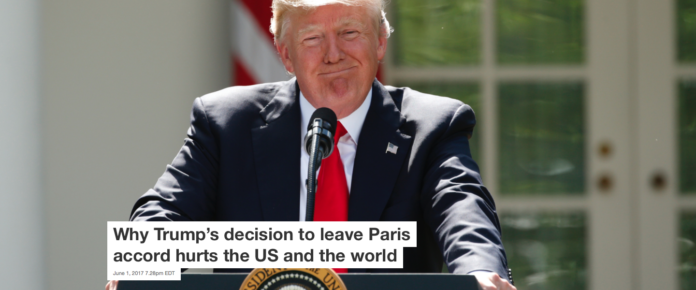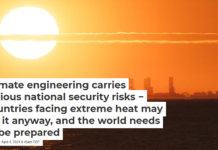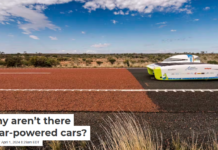

Travis N. Rieder, Johns Hopkins University; Anthony Janetos, Boston University; Kevin Trenberth, National Center for Atmospheric Research ; Marina v. N. Whitman, University of Michigan, and Matthew Russell, Drake University
Editor’s note: President Donald Trump stunned the world on June 1 by announcing his intention to withdraw the United States from the Paris climate accord, a landmark global agreement to lower greenhouse gas emissions and minimize the harm from climate change. We’ve assembled a panel of academics and scientists to analyze what this dramatic move means for the planet, U.S. businesses and the world’s poor.
A race to the bottom to destroy the planet
Kevin Trenberth, Distinguished Senior Scientist, National Center for Atmospheric Research
The whole of the Paris Agreement is based upon goodwill: There are no punitive actions or means to enforce the agreement. The goodwill also includes the Green Climate Fund for transferring money from rich countries to developing countries for building resilience, mitigating and adapting to the effects of climate change. The U.S. has pledged US$3 billion and has delivered $1 billion but seems unlikely to add to that. That alone undermines a lot of the good will. And it will be a major sore point in all small island-states and developing countries, who have not caused the problem of global warming.
The U.S. leadership was essential in Paris. If the U.S. does not lead by example – and we have a moral and ethical responsibility to do so as the country that has contributed more than any other to accumulated greenhouse gas emissions so far – then why should anyone else go along? Unless there is a universal carbon tax, fossil fuels appear to be the cheapest form of energy. That’s not true, of course, because of all the downstream effects on air quality and climate change.
So now what we are likely to face is either some form of trade wars in which heavy tariffs are used against the U.S. and other renegades, or the whole thing collapses and we all spiral into a race to the bottom, to see who can exploit and thus destroy the planet first.
Yes, other things are moving in positive directions, such as more use of renewable energy, but not yet fast enough: Ask India what it will do if it does not get technology transfer and help.
The U.S. cannot opt out without major other consequences, including those to the planet. Without the U.S. and Paris, we crash through the critical 2 degrees Celsius threshold before 2060 – the point at which climate scientists like me consider the most dangerous effects from climate change will become strongly evident – perhaps a decade earlier owing to U.S. pullout. And this means increasing trouble with ecosystems being out of whack with the climate, trouble farming current crops, and increasing shortages of food and water.
But if Paris is fully implemented and feeds back on itself to a new energy economy, we can delay 2 degrees C by 40 years, maybe. I believe that we will go through 2 degrees C by 2100 regardless. But with more time, we can adapt so much better. It will be bad enough under the best scenarios, but this could be bringing doomsday forward by 50 years (or more).
Paris withdrawal puts American businesses last
Marina v. N. Whitman, Professor of Business Administration and Public Policy, University of Michigan

Richard Schneider/flickr, CC BY-NC
If ever there was a decision contrary to our country’s business and economic interests – never mind our global standing and the impact on the poor countries most vulnerable to climate change – this may be it.
Corporate America already knows this. That’s why a cross-section of leading companies, including industrial powerhouses like General Electric and 3M, have urged the president to stay in the plan, which would allow the U.S. a greater say in how the agreement evolves. Even oil companies like ExxonMobil and ConocoPhillips have expressed support.
That’s in part because American companies have been leaders in developing clean energy, which has given U.S. manufacturing a competitive advantage in a sector that will only grow in importance. Withdrawal from Paris undermines this.
Besides ignoring the pleas of U.S. CEOs, Trump also rejected the advice of his secretary of state and the wishes of the 195 signatory countries, including American allies such as Germany and France, who pressed hard during the recent G-7 meeting to persuade Trump to stay in. They even suggested that the U.S. might have some leeway to reduce rather than increase its efforts on CO2 reduction – the accord, after all, is voluntary. Rather, we’ve thrown in our lot with Syria and Nicaragua, the only other countries that have rejected the accord.
It is not hard to imagine the hostility Trump showed our allies could adversely affect the outcome of bilateral trade talks with those countries, the kind Trump says he prefers over multilateral deals. In a full-page Wall Street Journal ad, 30 CEOs argued that “there is strong potential for negative trade implications if the United States exits from the Paris Agreement.”
If this is the way of putting American interests first, then look for the sun to rise in the West tomorrow morning.
Pulling out of Paris will harm the poor in the US and abroad
Anthony Janetos, Director, Frederick S. Pardee Center for the Study of the Longer-Range Future and Professor of Earth and Environment, Boston University

CIFOR/flickr, CC BY-NC-ND
Details on precisely what President Trump’s decision to pull the U.S. out of the Paris accord on climate change means and how this decision will be implemented are lacking, but it was already clear that the United States had little intention of meeting its emissions goals. The proposed dismantling of the Clean Power Plan to limit carbon emissions from power plants would essentially ensure that outcome.
But pulling out of Paris also means the U.S. will refuse to make any additional contributions to the U.N. Green Climate Fund. The fact that the world’s largest economy and the largest per capita emitter will decline to take on policies to curb greenhouse gas emissions and simultaneously refuse to contribute to a fund largely devoted to adaptation measures in the world’s poor countries is dangerous and unprecedented.
The impacts of climate change are not hypotheticals to be worried about far in the future. The last several IPCC reports – the international scientific assessments on climate change done through the U.N. – have made it abundantly clear that impacts are happening now. And even more recent science has shown that the probabilities of even individual extreme weather events (e.g., heat waves) can be attributed to climate change.
The international and domestic U.S. scientific assessments have concluded that climate impacts are disproportionately felt by poor populations both among and within countries – including our own. But such impacts significantly hamper poor countries, which tend to be very dependent on their agricultural sectors, have larger proportions of poor people and typically do not have resources available for recovery from climate-driven damages.
The desires in the developing world to improve quality of life in a sustainable way will not go away. Programs such as the U.N. Sustainable Development Goals are evidence of a deep commitment to those improvements. But with the U.S. decision to abandon the Paris accords, delivering on those commitments just got significantly more difficult.
How American farmers will be hurt
Matthew Russell, Resilient Agriculture Coordinator, Drake University
President Trump’s decision to withdraw from the Paris Agreement fails farmers, one of the major constituencies that helped him win the White House. Arguably, U.S. farmers are the most capable of developing systems to both reduce and remove greenhouse gas emissions. But the Trump administration is ignoring our nation’s farmers as a strategic national asset in the global fight against climate change.
For nearly a century, U.S. agriculture has been the uncontested leader in agricultural innovation. Farmers have had three important sources of support that helped them create the green revolution, which allowed production to keep up with global population growth. These include public research and education from land grant universities; private industry; and public policy, especially the federal farm bill but also state-level policies.
While there are still production challenges, the bigger challenges facing humanity are not increasing yields but maintaining productivity in the face of an increasingly hostile climate and a need to stabilize the climate before it deteriorates further.
Farmers all over the world must innovate to develop environmental services focused on greenhouse gas emissions and sinks. Unfortunately, the general attitude of U.S. farmers prevents them from embracing this new and emerging challenge. Many of them share President Trump’s skepticism about climate change.
Trump’s decision to leave the Paris Agreement is focused on energy policy and doesn’t consider American farmers. Yet agriculture is emerging as one of the most promising players in addressing climate change by sequestering carbon from the atmosphere in the soil. One can argue China, Europe, Australia and possibly even Brazil will start investing in agricultural innovation similar to the way China and Europe are investing in renewable energy.
For the last 100 years, American farmers, their elected officials, industries that serve them and great innovators like George Washington Carver, Henry Wallace and Norman Borlaug have led the world in developing agricultural solutions to big problems. The next big problem is climate change.
American farmers can be at the vanguard of finding agricultural solutions to sequestering carbon. But by abandoning the Paris Agreement, President Trump has shown that he is not going to help American farmers work on these solutions and, thus, reap the benefits. American farmers could still do it, but the president just made it much more difficult for them to do so and much more likely that farmers in another part of the world will lead the next agricultural revolution.
Pulling out of the Paris Agreement is unconscionable
Travis N. Rieder, Research Scholar at the Berman Institute of Bioethics, Johns Hopkins University
Like many, I have worried ever since the 2016 election that this day would come – that Donald Trump would formally announce his intention to withdraw from the Paris Agreement. As an ethicist, I have been occupied by a very particular question, which is whether withdrawing from the agreement, itself, matters morally.
Some have suggested that the policies to lower emissions matter, not the agreement to enact such policies. If Trump has no intention of holding up America’s end of the deal, then does the actual withdrawal from the agreement make a difference? I think that it might, because staying in the agreement and going through the motions (but failing) means something fundamentally different from formally withdrawing.
Presumably, many countries will fail in their climate obligations at one time or another. Other parties to the agreement will have the opportunity to admonish them for this failure, and to work together to form a new plan that is more likely to succeed.
But, announcing America’s intention to withdraw from the agreement sends a clear message to the rest of the world that the second-highest emitting nation has no intention of doing its part to save the world’s most vulnerable people from impending harm. Indeed: The U.S. government takes the problem so unseriously, and values the lives of those at risk so little, that it will try desperately to undermine the already far-too-modest climate actions that the Obama administration set in motion.
The game-theoretic puzzle here is a common feature of collective action problems: Abandoning an agreement (or “defecting”) changes the rational deliberation of other parties to the agreement. It may be rational for some nations to sacrifice for the greater good when they believe that everyone will do likewise. But, is it still rational when one of the major players – one who has gained most from causing the problem, and will pay least as the problem becomes more serious – announces his intention to defect?
My hope is that every other party to the Paris Agreement will believe that the answer is yes, and that they will count on us, the American people, to right this wrong as soon as we can. But my most desperate fear is that this announcement will confirm the world’s suspicion that America cannot be trusted to do its part, and that this will make it harder for them to justify making any sacrifice at all.
This sort of scenario will not likely mean the end of the Paris Agreement, but it could weaken it considerably, as other nations’ leaders become less willing to make sacrifices on the backs of their people.
![]() In short: Trump’s actions today may further slow our already-too-modest climate action and threaten the health and lives of the most vulnerable. This would be a serious injustice, and its commission by our elected leader is unconscionable.
In short: Trump’s actions today may further slow our already-too-modest climate action and threaten the health and lives of the most vulnerable. This would be a serious injustice, and its commission by our elected leader is unconscionable.
Travis N. Rieder, Research Scholar at the Berman Institute of Bioethics, Johns Hopkins University; Anthony Janetos, Director, Frederick S. Pardee Center for the Study of the Longer-Range Future and Professor of Earth and Environment, Boston University; Kevin Trenberth, Distinguished Senior Scientist, National Center for Atmospheric Research ; Marina v. N. Whitman, Professor of Business Administration and Public Policy, University of Michigan, and Matthew Russell, Resilient Agriculture Coordinator, Drake University
This article was originally published on The Conversation. Read the original article.



















